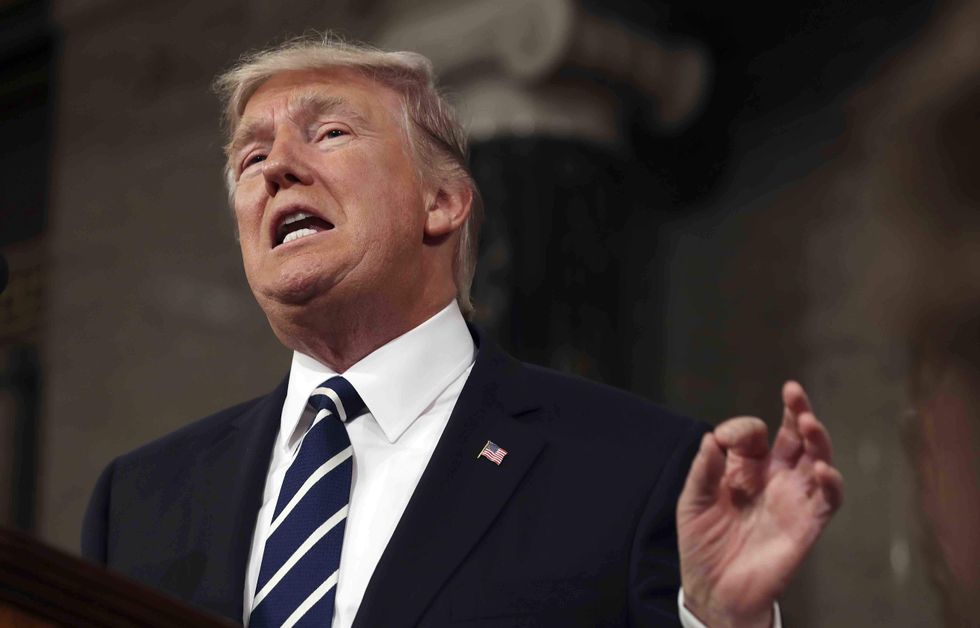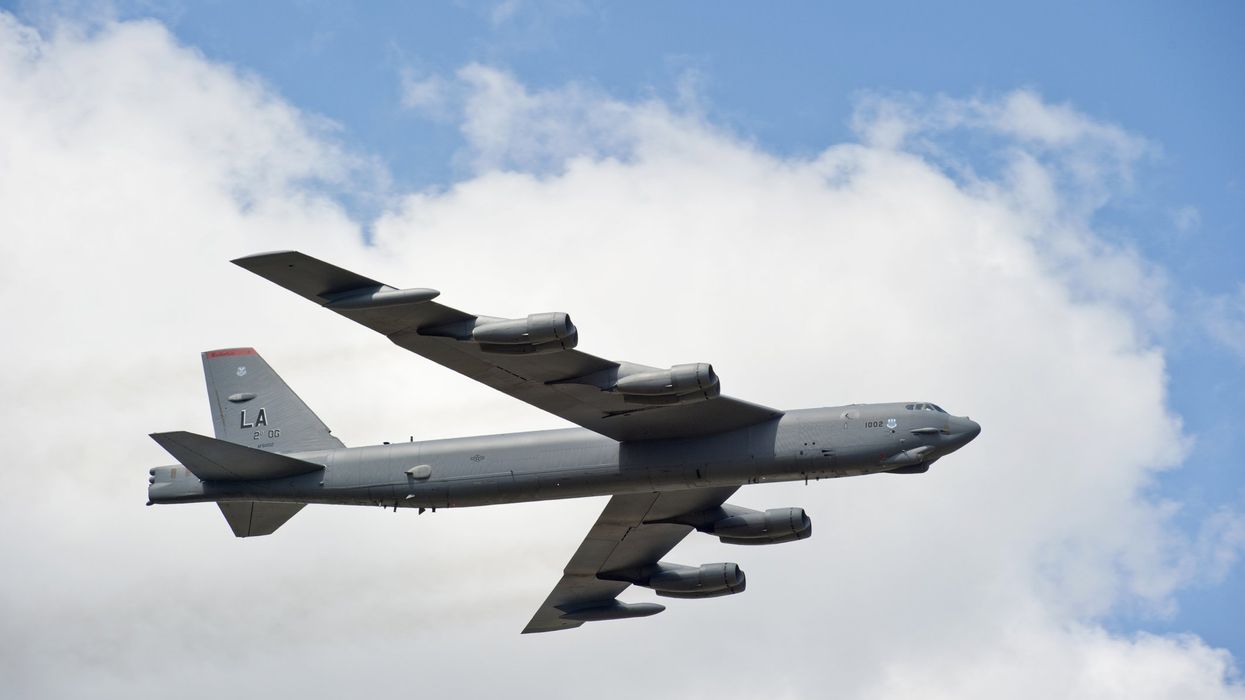WASHINGTON — President Donald Trump, in his first address Tuesday before a joint session of Congress, laid out his plan for the year ahead, touching on a variety of issues, including immigration reform, the fight against ISIS, trade, tax reform, infrastructure and health care.
"A new chapter of American greatness is now beginning," Trump said. "A new national pride is sweeping across our nation. And a new surge of optimism is placing impossible dreams firmly within our grasp. What we are witnessing today is the renewal of the American spirit."
"Our allies will find that America is once again ready to lead," the president added, to thunderous applause from members of Congress.
Trump then launched into six major issues he said will "make America great again."
Immigration
Repeating his call for a "great great wall" along the U.S.'s southern border with Mexico, Trump called on Congress to build on his executive order, which promises to "employ all lawful means" to enforce existing immigration laws, including the withdrawal of federal funding for sanctuary cities.
"By finally enforcing our immigration laws, we will raise wages, help the unemployed, save billions of dollars and make our communities safer for everyone. We want all Americans to succeed, but that can't happen in an environment of lawless chaos," the president said, going on to emphasize the need to "restore integrity and the rule of law to our border."
Trump said that even as he spoke, the "bad ones" are leaving the country, "as I have promised."
ISIS
Noting the "strong measures" his administration has taken to protect Americans from radical Islamic terrorists, including ISIS, Trump acknowledged the several domestic terror attacks: 9/11, the Boston Marathon bombing and the shooting in San Bernardino, California.
He went on to pay homage to various attacks overseas, including in France, Belgium and Germany.
"It is not compassionate, but reckless, to allow uncontrolled entry from places where proper vetting cannot occur," Trump said.
During the campaign, Trump pushed for "extreme vetting." Just one week after taking office, he signed an executive order temporarily banning travel to the U.S. from seven countries in the Middle East. That executive order fell into legal limbo. But a new, revised executive order is expected as early as Wednesday, in addition to "new steps" Trump promised Tuesday to keep America safe. He did not say what the "new steps" will be.
Trade
Using this issue to woo white working-class voters, particularly in the Rust Belt, Trump followed up his campaign rhetoric by calling attention to yet another one of his executive orders, in which he declared the U.S.'s withdrawal from the TransPacific Partnership, known as TPP.
And, mentioning the agreement he once called the "worst deal ever negotiated," Trump again expressed his desire to renegotiate the North American Free Trade Agreement, or NAFTA, which he said has cost Americans "more than one-fourth of our manufacturing jobs."
The president also mentioned China, which he railed against during the campaign for "manipulating" currency and "taking advantage" of the U.S.
"We must restart the engine of the American economy," Trump said, "making it easier for companies to do business in the United States and much harder for companies to leave."
Tax reform
One of the things that would make it harder for companies to take their business overseas, Trump said, is a border tax.
"Currently, when we ship products out of America, many other countries make us pay very high tariffs and taxes, but when foreign companies ship their products into America, we charge them almost nothing." Trump said that during his visit earlier this month with executives from Harley Davidson, they told him that one country taxed the company's motorcycles at 100 percent.
"They told me, without even complaining because they have been mistreated for so long that they have become used to it, that it is very hard to do business with other countries because they tax our goods at such a high rate," Trump said. "They weren't even asking for a change. But I am."
In addition to new tariffs, Trump proposed reducing the tax rate for companies, giving "massive tax relief" for middle class earners and bringing back "millions" of jobs. But to ensure those jobs are decent paying, Trump added, further action to the legal immigration system is needed.
Trump called for a "merit-based" immigration system, like those in other countries such as Canada and Australia.
"It's a principle that those seeking to enter a country ought to be able to to support themselves financially," Trump explained. "Yet, in America, we do not enforce this rule, straining the very public resources that our poorest citizens rely upon" and that costs taxpayers "many billions of dollars a year."
Trump said that switching from the current system of "lower-skilled immigration," and instead adopting a merit-based system would yield many benefits, including higher wages, and help struggling families, "including immigrant families" become part of the American middle class.
Infrastructure
Trump called on members of Congress to pass a $1 trillion infrastructure bill, financed through "both public and private capital," but did not offer any ideas on how to get private entities to foot part of the massive bill. Doing this, the president said, would also create "millions of new jobs" by hiring only American workers and buying only American materials.
"America has spent approximately $6 trillion in the Middle East, all this while our infrastructure at home is crumbling. With this in six trillion dollars, we could have rebuilt our country twice," Trump said.
"And maybe even three times if we had people who had the ability to negotiate," Trump added, prompting laughs from some members of Congress.
Health care
Last, but certainly not least, Trump laid out his plan to repeal and replace Obamacare by allowing patients to purchase health insurance across state lines, expanding the use of Health Savings Accounts and making it illegal for health insurance companies to impose "unnecessary costs."
"Mandating every American to buy government-approved health insurance was never the right solution for America," Trump said, blasting Obamacare, which he said is "collapsing." "We must act decisively to protect all Americans," Trump added. "Action is not a choice. It is a necessity."
Trump issued an executive order his first day in office that was aimed to reduce the regulatory burdens imposed by Obamacare. But as Republicans have delved into developing a plan of their own to replace the 2010 Affordable Care Act, it's safe to say they've run into challenges.
“Now, I have to tell you, it’s an unbelievably complex subject. Nobody knew health care could be so complicated," Trump said Monday while addressing a gathering of the nation's governors.
Republicans in Congress are now reportedly "grappling" with whether they should keep some "core provisions" of the law. But Trump didn't seem willing to entertain that notion Tuesday as he explicitly called for the "repeal and replace" of Obamacare. He did, however, leave the door open to working with Democrats on the issue.
"Our citizens deserve this, and so much more — so why not join forces to finally get it done?" Trump said.



